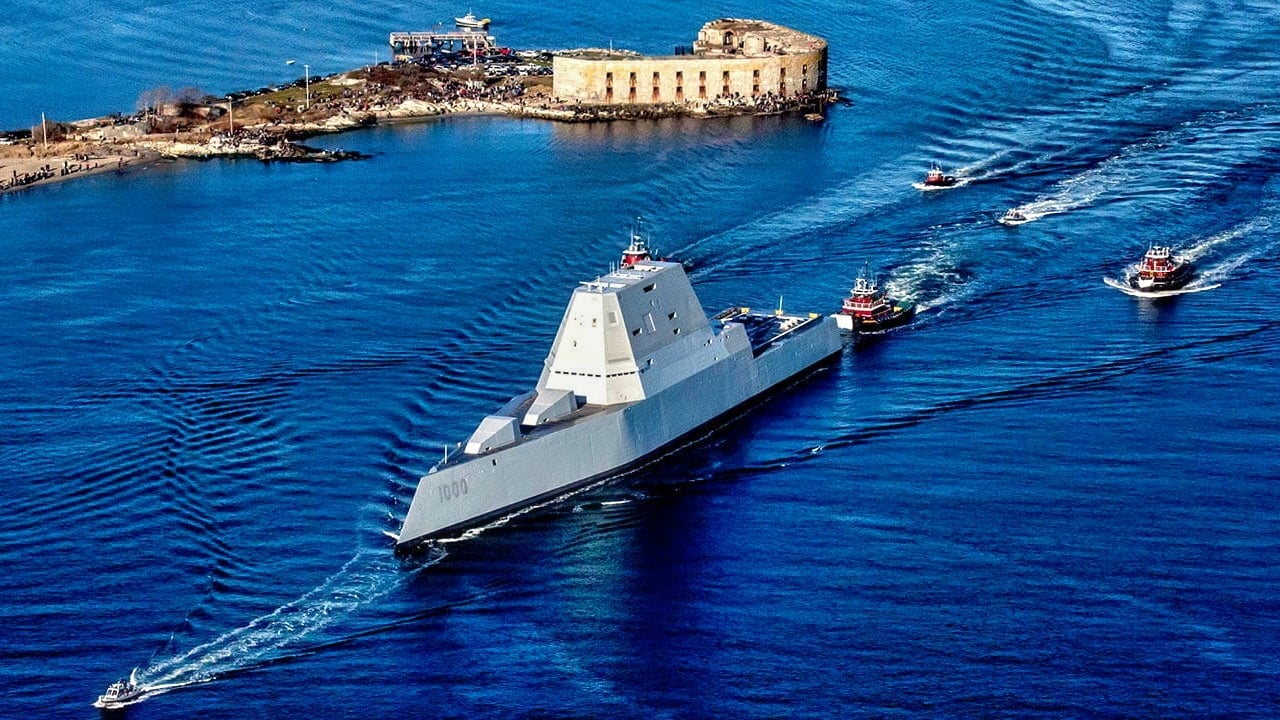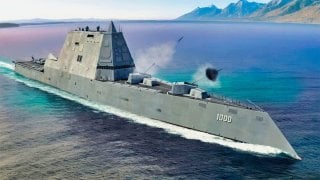Zumwalt-Class: Don't You Dare Call This Destroyer a Battleship
The Zumwalt-class destroyer will never be the battleship of the twenty-first century. It’s the U.S. Navy’s version of the Russian Admiral Kuznetsov aircraft carrier.
The Zumwalt-class Destroyer is Not the Battleship of the Twenty-First Century: The United States Navy is trying to put lipstick on a pig. The Zumwalt-class destroyer was slated to be the next great innovation in naval warfare. It was to be the equivalent of the F-22A Raptor for the High Seas. Looking like something that Elliot Carver, the gonzo villain in the 1997 James Bond film, Tomorrow Never Dies, would use and less like a real U.S. Navy warship, the Zumwalt-class has been a perennial reminder of just how bad the Navy has gotten at building warships.
After twenty years of trying to make these boats work according to the sales pitch, having spent $22.5 billion on these boats, the largest destroyers ever built, the Navy is in a very bad spot of having the justify the waste in time, resources, and manpower to build the world’s greatest jalopy. In classic bureaucratic fashion, rather than simply admit the failure that is the Zumwalt-class destroyer, the Navy wants to try to repackage them.
Hence, putting lipstick on a pig. But you can’t repackage a failed design. The failure of the Zumwalt-class destroyers is embedded within the very foundations of the program and evolved into a floating disaster the longer that the program went on.
The Navy Lies to Itself (and the American Taxpayer)
Today, the Navy wants to try to sell people on the notion that these boats can simply be repurposed into the twenty-first-century equivalent of battleships. On its face that is an absurdity of the ages. But the Navy is going to push for this to become a reality. Never mind the fact that the Zumwalts lack the armor that the battleships of old possessed. Forget the fact that the armaments package on these boats is infinitesimal when compared to yesteryear’s battlewagons.
Ah, you see, the Navy wants you to think that just by replacing the current pathetic armaments package of the Zumwalt-class with hypersonic cruise missiles, they can make these failed warships into something impressive. The only thing impressive in this author’s opinion is the amount of chutzpah displayed by the Navy’s PR team.
The Pentagon is in C.Y.A. mode. But no amount of spinning will make these lame turkeys fly.
Let’s just look at the primary feature of the Zumwalt-class, shall we?
A History of Failure
This ship was to be the first stealth warship ever built. It was designed with low radar cross-sections, for example. A single Zumwalt-class destroyer is far larger than its Arleigh Burke-class predecessor.
Yet, it supposedly has a radar cross-section that is no longer than that of a fishing boat. That’s because the Zumwaltis were built with a tumblehome-type hull that narrows above the waterline. The Navy encased this tumblehome hull with a composite alloy that makes the ship extremely hard to track on radar.
Harrison Kass wrote in these pages that the Zumwalts are “uncommonly quiet” for destroyers. Their, “acoustic signature is closer to that of the Los Angeles-class submarine than to the Arleigh Burke destroyer.”
All that is well and good. But the Zumwalts were designed for an age in which the United States military was the unquestioned hegemon. They could move units with relative impunity close to the shores of potential enemies and unleash Hell upon those targets.

Yet, the instant that the Zumwalt-class appears to conduct strikes against enemy ground targets, they can be visually spotted by an enemy scout wielding binoculars. The reduced radar cross-section provides little protection for the warship when operating within the visual range of the enemy.
What’s more, the moment the Zumwalt fired its payload its stealth would be gone, as the enemy would quickly discern that the Zumwalt was a destroyer rather than some fishing boat off their coast.
So, even the vaunted stealth capabilities of these boats are not that great.
And what about the “impressive” weapons systems of these boats? Well, they’re not impressive. Originally, Zumwalt’s Advanced Gun System (AGS) was trumpeted as the great weapon system of its time. It was deemed a total failure. That’s because the specialized 155 mm rounds designed for these systems, the Long Range Land Attack Projectile (LRLAP), became too expensive to mass produce.
So, the Pentagon reduced the ammunition order, meaning that there was an artificial limit to how many rounds each ship would have in combat. That made the guns unusable.
This led to the calls by the Navy to embrace the Conventional Prompt Strike (CPS) hypersonic weapons platform. Launched from Multiple All-Up Round Canisters (MACs), each MAC holds three CPS missiles. According to their specifications, the CPS is a boost-glide missile with a kinetic-energy warhead that can travel upwards of Mach 5 (3,800 miles per hour).
Here's the problem: the CPS is in no way ready for showtime. Given the limitations of the Navy’s budget under current conditions, it is unlikely that the Navy will be able to develop these proposed weapons promptly.
So, here again, the Zumwalt-class destroyers are failing to deliver.
Armor? What Armor?
Lastly, the Zumwalts-as-new-age-battleships trope dies when it comes to the ship’s defenses. Namely, it cannot sustain the kind of pounding that the battleships of yore could handle. Consider this, according to Robert Farley writing in these pages,
“Despite its large size, the Zumwalt is not designed to survive hits from cruise missiles. Even a single hit has the potential to sink, or more likely, disable the warship.” If such a weapon hit a battleship from the previous century, that battleship would take the hit, keep fighting, and likely give as good as it got.
Let’s get this straight. The Zumwalt-class began its existence as a boondoggle. Its first weapons system was an abject failure. So, now, the Pentagon wants to spend billions of dollars upgrading and replacing that failed system with an experimental hypersonic weapons platform that has yet to prove itself, let alone be effectively mass-produced.
Then, its armor is so weak it can be taken out by a single cruise missile. And, as a topper to this sordid affair, its vaunted stealth capability is rubbish.
The Zumwalt-class destroyer will never be the battleship of the twenty-first century. It’s the U.S. Navy’s version of the Russian Admiral Kuznetsov aircraft carrier.
About the Author:
Brandon J. Weichert, a National Interest national security analyst, is a former Congressional staffer and geopolitical analyst who is a contributor at The Washington Times, the Asia Times, and The-Pipeline. He is the author of Winning Space: How America Remains a Superpower, Biohacked: China’s Race to Control Life, and The Shadow War: Iran’s Quest for Supremacy. His next book, A Disaster of Our Own Making: How the West Lost Ukraine, is available for purchase wherever books are sold. Weichert can be followed via Twitter @WeTheBrandon.
Image Credit: Creative Commons and/or Shutterstock.


